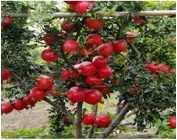Pomegranate Tissue Culture
What is a Pomegranate?
Pomegranate (Punica granatum) is a fruit-bearing deciduous shrub in the family Lythraceae, subfamily Punicoideae, that grows between 5 and 10 m (16 and 33 ft) tall.
The fruit is typically in season in the Northern Hemisphere from September to February, and in the Southern Hemisphere from March to May. As intact arils or juice, pomegranates are used in baking, cooking, juice blends, meal garnishes, smoothies, and alcoholic beverages, such as cocktails and wine. The pomegranate originated in the region extending from Iran to northern India.
A shrub or small tree growing 5 to 10 m (16 to 33 ft) high, the pomegranate has multiple spiny branches and is extremely long-lived, with some specimens in France surviving for 200 years. P. granatum leaves are opposite or subopposite, glossy, narrow oblong, entire, 3–7 cm (1 1⁄4–2 3⁄4 in) long and 2 cm (3⁄4 in) broad. The flowers are bright red and 3 cm (1.2 in) in diameter, with three to seven petals. Some fruitless varieties are grown for the flowers alone.
Why Pomegranate?
- granatum is grown for its fruit crop, and as ornamental trees and shrubs in parks and gardens. Mature specimens can develop sculptural twisted-bark multiple trunks and a distinctive overall form. Pomegranates are drought-tolerant, and can be grown in dry areas with either a Mediterranean winter rainfall climate or in summer rainfall climates. In wetter areas, they can be prone to root decay from fungal diseases. They can be tolerant of moderate frost, down to about −12 °C (10 °F).
A 100 g (3.5 oz) serving of pomegranate arils provides 12% of the Daily Value (DV) for vitamin C, 16% DV for vitamin K and 10% DV for folate (table).
Pomegranate seeds are a rich source of dietary fiber (20% DV) which is entirely contained in the edible seeds. People who choose to discard the seeds forfeit nutritional benefits conveyed by the seed fiber and micronutrients.
In India’s ancient Ayurveda system of traditional medicine, the pomegranate is frequently described as an ingredient in remedies.
What is Plant Tissue Culture?
Plant Tissue Culture refers to a set of techniques which are used to grow or maintain a set of plant cells or tissues under sterile conditions on a nutrient culture medium of known composition. It is widely used to produce clones of a plant in a method known as micropropagation. Different techniques in plant tissue culture may offer certain advantages over traditional methods of propagation, including:
- The production of exact copies of plants that have certain desirable traits.
- To quickly produce mature plants.
- The production of multiple plants without seeds or necessary pollinators to produce seeds.
- The regeneration of whole plants from plant cells that have been genetically modified.
- The production of plants in sterile containers that allows them to be moved with greatly reduced chances of transmitting diseases, pests, and pathogens.
- To clear particular plants of viral and other infections and to quickly multiply these plants as ‘cleaned stock’ for horticulture and agriculture.
Why Pomegranate Tissue Culture Plants?
Pomegranate Plantation is vulnerable to many diseases such as:
- Cercospora fruit spot in which tiny dark spots appear on leaves and sepals. The spots eventually enlarge and coalesce leading to yellowing of leaves until it finally drops off.
- Heart rot which is a fungal disease that causes the decay of wood at the center of the trunk and branches. Fungi enter the tree through wounds in the bark and decay the heartwood. The diseased heartwood softens resulting in trees being structurally weaker and prone to breakage.
- Pests such as Aphids and Leaf-Footed Plant Bugs. Aphis punicae Passerini is one among the serious pests attacking pomegranate orchards. Young pomegranate leaves are highly susceptible to aphid attacks during June- August. High humidity favours the multiplication aphid.
Due to these factors, Pomegranate tree care is very essential in nature. We at Hybrid Agri use plant tissue culture techniques to not only help you protect your yield from such diseases, but also help you maximize the yield using the cutting edge technology in our possession.
Why Hybrid Agri’s Tissue Culture Pomegranate Plant?
We at Hybrid Agri using tissue culture in pomegranate plants to give hybrid plants to not only help you protect your yield from such diseases but also help you maximize the yield using the cutting edge technology in our possession.
The Pomegranate Tissue Culture Procedure involves:
- Initiation of aseptic cultures from shoot-tips obtained from disease-free Pomegranate plants
- Multiplication of the shoots to the desired scale
- Induction of roots to individual shoots
- Primary & secondary hardening of the tender plantlets in the poly-house
- Field-transfer of the hardened tissue culture plants
Pomegranate tissue culture plants in India has seen major growth in the last few decades, and we are at the helm of this innovation. We at Hybrid Agri Pvt Ltd, are among the top pomegranate tissue culture plant suppliers in India. We will not only help you protect your yield from such plant diseases, but also help you maximize your output using our cutting-edge tissue culture technologies. We develop the tissue culture pomegranate plants in sterile containers as a protection from pests and pathogens, as well as for convenience in transportation.
Our pomegranate tissue culture plants not only give better yields than conventionally raised date trees, but also grow to maturity in considerably less time. The tissue culture technique employed by us provides us the opportunity to maintain the optimum growth conditions, thereby resulting in uniform growth of plants. All of this enables us to produce disease-free and healthy plants which ultimately results in increased profitability.


 WhatsApp us
WhatsApp us